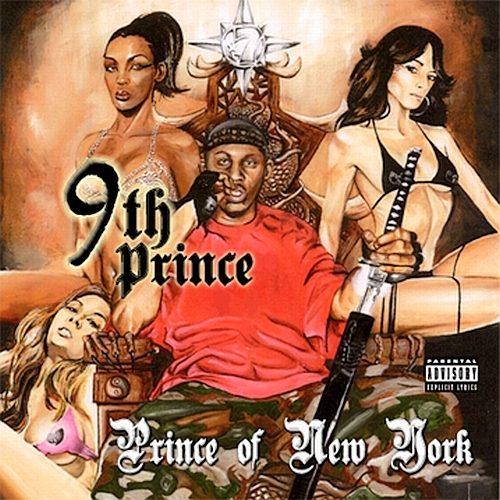This is the newest offering from one of the members of the renowned Wu-Tang-affiliated Killarmy, a collection of “lost tapes” from the self-proclaimed “Grandaddy flow,” 9th Prince. It is a collection of gems that unfortunately never saw the light of a proper release before now. 9th, the younger brother of RZA, is a major talent in his own right who spits raw, straight-forward, guillotine rap, that is a welcome throwback to the early days of the Wu. Though serving a stint in a maximum security federal penitentiary in upstate New York when this album was pieced together, the disc is certainly proof that the emcee had plenty of unheard material in his archive worthy of an army of listeners.
Usually when someone decides to gather various tracks previously recorded it feels like there is a lack of balance; whether this be a fault of the production quality, or the overall feel of the collection is unbalanced. “Prince of New York” has a mostly cohesive feel to it. That is likely because he has a style that does not go to astray from simple rugged emceeing. Furthermore, the album, except for the bonus tracks, is mainly produced by just three choice producers: Gooch, Monster and Freedom Productions.
While “The Writer” showcases the lyrical capacity of 9th and is an excellent opening track, the follow-up “Sniper Challengers” is an ideal example of hardcore Wu-Tang music. The oriental backdrop coupled with the tense, dramatic tones, are truly awe-inspiring. Here, 9th raps venomously, with both a descriptive and violent demeanor. 9th shares mic time with Islord on here, who also handles his own.
The next joint, “Ain’t Promised Tomorrow,” speaks on the fragility of life over a well-orchestrated chipmunk beat. This is a prime example of his dark content:
“Life is a gamble
We scramble for dollas
Real niggaz holla
My snub nose pop your colla
I burn hotter than lava
Grandaddy flow saga
You ain’t promised tomorrow”
This is one of the stronger choruses on the LP, which is otherwise something that Prince sometimes struggles with in comparison to his effective spitfire verses. This aggressive candor does not lend itself to very enticing hooks, especially since they call on 9th to simplify his approach.
A lot of Wu-Tang fans will take a look at the liner notes to see if their favorites are featured. The only one of the original group members of the Wu that appeared on “36 Chambers” is Masta Killa, who rhymes nicely over the thumping “Hood Life,” certainly making it one of the premier tracks on the disc. Meanwhile, Tommy Whispers shows up on a few tracks including the excellent “Street Pharmacists,” along side a always poignant Trife Da God. Still, “Prince of New York” is mostly 9th Prince’s show.
The last six tracks are considered to be bonuses (yes, six). Assumedly, these were even older recordings as there is the aforementioned track “Hood Life” and “We Supreme” produced by a staple of the Wu-Tang stamp in 4th Disciple. “Like Like” has a more subdued, heavy bass, sound by Beretta 9, but is also a banger. Some of these songs just sound different, as if they do not belong, but their presence is still helpful to add total weight to the album–it would be in the 35 minute range without them. “Stand Proud” for instance has a very soulful feel and a catchy female vocalist on the hook. It’s a good joint in it’s own right; however, it feels too pop for Prince’s personality, .
The culminating track, “We Write the Songs” is a disappointing close to a disc full of strong material. It has a terrible sing-songy hook that just does not work. It is understandable that they put it at the end to help bookend “The Writer” which opens the album.
Fans have been thirsting for the spiritual successor to “36 Chambers” for a long time now. This is something that will allude listeners until the end of time. However, it is safe to say that few albums exude the kind of rough, rugged, unadulterated hip-hop as 9th Prince’s “Prince of New York”–and that’s a damn good thing.

